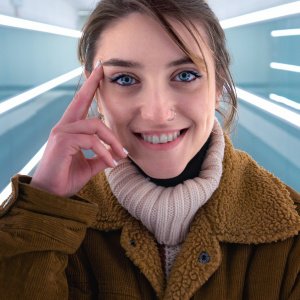Eleonora Torchia

Master's degree graduate in Cellular & Molecular Biotechnology - Cancer Biology
Participate in:
Ready4Future - The future of work between science and technologyReady4Future: the future of work between science, art, and technology
4W4I - Contamination and Gender Gap
ELLE Active! 2022 - Values and Jobs
Questions to understand the present and design the future
Women&Tech® Young Ambassadors
My name is Eleonora Torchia and I like to define myself as a "contaminated" biotechnologist.
Thanks to the strong passion that my high school biology teacher instilled in me, I chose to continue my education in the scientific field, overcoming the socio-cultural norms for women. I actually come from a classical high school and without ever forgetting the importance of the "Arts," I still continue my journey as a scientist.
In the last year of the three-year course in Industrial Biotechnology in Oristano (Sardinia), I won a regional scholarship to carry out an internship at the Department of Cellular, Computational and Integrated Biology, located in the hills of Povo (TN). I became so passionate about the topics addressed, such as personalized medicine and oncology, that in the summer of 2019 I decided to enroll in the master's degree in Cellular and Molecular Biotechnology at the University of Trento, choosing the academic path in Cancer Biology.
To give continuity to the three-year internship, I decided to focus on personalized medicine: specifically, I wrote my experimental thesis on the quantitative and qualitative characterization of Extracellular Vesicles isolated from liquid biopsies of patients with different stages of prostate cancer.
Despite the proposal of a PhD at the same laboratory, I decided to return to Sardinia. "Why?" many people asked me.
I decided to temporarily abandon the idea of continuing in the academic field simply because I did not feel ready and because I still have the desire to bring and add value to my knowledge and skills on this island.
In the two years following graduation, I tried to broaden my cultural background to make my profile attractive also in the corporate world: therefore, I obtained a certification as a technician for the certification of agricultural products. From there, I had the opportunity to do an internship at a famous fruit and vegetable company in Sardinia, where I could apply the various skills learned in the quality control field.
Yet there was something that still occupied my mind: what if I got back to the academy again?
So, after completing the internship, I decided to apply for two teaching assistant positions at the University of Oristano, specifically in Industrial Chemistry and Pharmacology. During this experience, I remembered how right my high school biology teacher was: you never stop learning! I attended the classes as if it were the first time and reviewing some concepts made me realize how much I enjoyed "researching" the why.
In March, speaking with the Pharmacology professor, I discovered that the University of Cagliari had opened applications for a PhD program and so, somewhat playfully, I decided to look at the course descriptions.
Almost unexpectedly, I had a kind of imprinting with "Science and Technologies for Innovation" and in particular with one of the most ambitious projects of one of the laboratories that deals with energy and the environment: the use of microalgae for space exploration. I immediately thought it was crazy, especially because I had no idea how microalgae were cultivated, having always dealt with mammalian cells.
In an instant I said to myself: this is a challenge. And I swear that I hadn't felt this adrenaline in a long time. It was so strong that I decided to apply for the doctorate, even though I knew that my educational background was far from what I would then be doing if they ever accepted me.
Well, in the end I was admitted and in October of this 2024 I will start the PhD program.
I do not know exactly where this experience will lead me, but I am convinced that I will learn many things and above all I will learn to appreciate more the small steps that I am still taking to create my own place in the world.